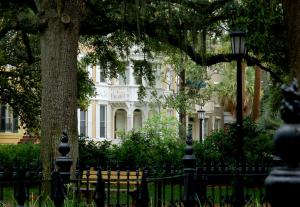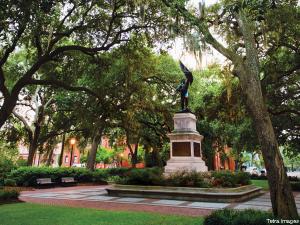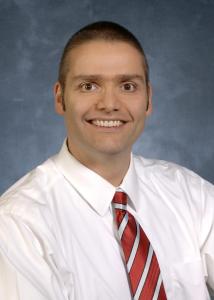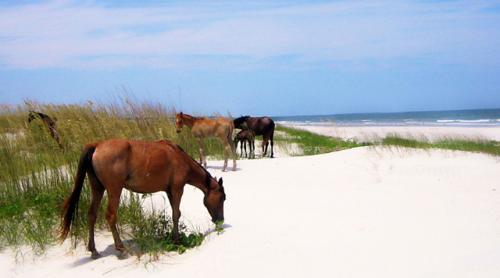Quick Links
Savannah 2015
 2015 IEOC/Acrivet Symposium
2015 IEOC/Acrivet Symposium
![]()
Savannah, Georgia, USA - June 4-6
IEOC is pleased to announce that the 2015 IEOC/Acrivet Symposium will take place June 4-6, 2015 in Savannah, Georgia. The host hotel is the Hilton Savannah DeSoto, located in the center of this bustling, historic town, allowing key access to many prized historic areas.
State of the Art Lecturers' Notes (must be logged in to view)
 The traditional 'South' will welcome you to enjoy some good, old-fashioned southern charm. Thursday evening will open with an outdoor reception in an adjacent, lovely city square. Plan to stay and enjoy this fabulous, walk-able, historic Southern city, filled with alluring sights, history and unique tastes of the US South.
The traditional 'South' will welcome you to enjoy some good, old-fashioned southern charm. Thursday evening will open with an outdoor reception in an adjacent, lovely city square. Plan to stay and enjoy this fabulous, walk-able, historic Southern city, filled with alluring sights, history and unique tastes of the US South.
Thank you to our primary sponsor this year, Acrivet! This sponsor has long been a supporter of the IEOC and veterinary ophthalmology. Be sure to visit their booth at the Symposium.
Call for Papers & Case Reports
The Call for Papers is now closed. Thank you for all your submissions!
Abstract Submission
Case Report Submission
Interested in participating as a speaker? We invite members of all levels to submit an abstract or case report through the call for papers process. Learn more... about course content and presentation format/expectations.
Schedule with presentation times and topics. (subject to change)
Tentative Schedule
Thursday, June 4, 2015
6:00pm-8:00pm Welcome Reception at Madison Square
Friday, June 5, 2015
8:00am-5:00pm Registration desk open
8:30am-9:00am Continental bteakfast with exhibitors
9:00am-9:15am Welcome and introduction
9:15am-10:15am State of the Art Lecture - Dr. Victor Perez, "Inflammatory Disease of the Eye"
10:15am-10:30am Coffee break with exhibitors
10:30am-11:30am State of the Art Lecture cont.
11:30am-12:30pm Scientific Abstract Presentations
Topics include: Leptospira, Gentamicin for Uveitis, Minocycline in Tear Film,
12:30pm-1:30pm Lunch
1:30pm-2:10pm Scientific Abstract Presentations
Topics include: Missense Mutation, Photodynamic Therapy for Eyelid Neoplasia
2:10pm-2:55pm Case Reports Presentations
Topics include: Lens, Vitreous, Orbit, Gobe, Intraocular Neoplasia
2:55pm-3:15pm Coffee break with exhibitors
3:15pm-4:30pm Case Reports Presentations
Topics include: Adnexa, Cornea
4:30pm-5:00pm Member Business Meeting
6:00pm-6:15pm Meet in lobby to walk to dinner (ticket required)
6:30pm-8:30pm Dinner at Savannah River House
8:25pm-9:55pm Historic Haunted Tour #1 (ticket required) SOLD OUT!
8:45pm-10:15pm Historic Haunted Tour #2 (ticket required) SOLD OUT!
Saturday, June 6, 2015
8:00am-5:00pm Registration desk open
8:30am-9:00am Continental breakfast with exhibitors
9:00am-9:15am Speaker introduction
9:15am-10:15am State of the Art Lecture - Dr. Nigel Cambell, "Anesthesia and Sedation"
10:15am-10:30am Coffee break with exhibitors
10:30am-11:30am State of the Art Lecture cont.
11:30am-12:30pm Scientific Abstract Presentations
Topics include: Post-anesthetic Complications, Refractive Errors, Atropine,
12:30pm-1:30pm Lunch with exhibitors
1:30pm-3:10pm Scientific Abstract Presentations
Topics inclue: Corneal Lesions, Corneal Stromal Abscesses, Ideopathic Keratitis
3:10pm-3:30pm Coffee break with exhibitors
3:30pm-5:00pm Case Report Presentations
Topics include: Cornea, Uvea, Lens, Adnexa
5:00pm Adjourn
State of the Art Speakers
We are very grateful to the following 'State of the Art Speakers' who have committed to present in Savannah.
 Victor Perez, MD
Victor Perez, MD
Director, Ocular Surface Center
Professor of Ophthalmology, Microbiology and Immunology
Walter G. Ross Distinguished Chair in Ophthalmic Research
University of Miami Miller School of Medicine
Bascom Palmer Eye Institute
Title: "Inflammatory Disease of the Eye: a window to systemic diseases in humans".
Description: The role of ocular inflammatory diseases in the equine field is well documented and pathways of diseases and treatments are common. However, new ways of thinking about diagnosis and development of novel immunotherapeutic modalities can be extrapolated between the equine and human eye. The goal of this presentation will be to describe known clinical presentations of systemic immune disease in the eye of human patients and how these could be similar to horses. Moreover, we will discuss potential common pathways of immune pathology and how we can learn to improve clinical outcomes by comparing local and systemic immune modulatory therapies.
Biography: Victor L. Perez, MD received his bachelor’s degree in biology from the Washington University in St. Louis and medical doctorate from the University of Puerto Rico School of Medicine in San Juan, Puerto Rico. He performed his residency training at the Massachusetts Eye & Ear Infirmary at the Harvard Medical School in Boston, Massachusetts. Dr. Perez then completed Cornea and External Diseases (Dr. Dimitri Azar) and Uveitis fellowships (Dr. Stephen Foster) at the Massachusetts Eye & Ear Infirmary at the Harvard Medical School. In addition to this, he also trained as an Immunologist Scientist Research Fellow in Ocular Immunology at Schepens Eye Research Institute at the Harvard Medical School (Dr. JW Streilein) and a did a Research Fellowship in Immunology at the Department of Pathology, Brigham & Women's Hospital in Boston, Massachusetts (Dr. Abul K Abbas).
Dr. Perez is a board certified ophthalmologist by the American Board of Ophthalmology. He is the Director of the Ocular Surface Center and is the Walter G. Ross Distinguished Chair in Ophthalmic Research Programs at the Bascom Palmer Eye Institute. His research is focused in understanding immune mechanisms of ocular inflammatory diseases the lead to blindness and development of biological targeted therapies for prevention and treatment, as well as stem cell regenerative approaches.
More information regarding his research focus is located here.
 Dr. Nigel Campbell, BVetMed, PhD, DACVIM(LA), DACVAA, MRCVS
Dr. Nigel Campbell, BVetMed, PhD, DACVIM(LA), DACVAA, MRCVS
Clinical Assistant Professor of Anesthesiology at North Carolina State University.
Biography: Dr. Campbell has worked in equine practice, completed a residency on equine internal medicine and earned his PhD in physiology. He is double-boarded as a Diplomate of the American College of Veterinary Internal Medicine (Large Animal) and the American College of Veterinary Anesthesia and Analgesia. More biographical information on Dr. Campbell.
Titles: "Sedation and General Anesthetic Techniques in Equine Ophthalmology" and "Equine Analgesia"
Dr. Campbell will discuss: 1. Standing sedation for diagnostic and surgical techniques including protocols for constant rate infusions for longer procedures and the use of nerve blocks. 2. Approaches for general anesthesia focusing on both injectable and inhalational techniques including the use of neuromuscular blockade. Strategies for recovery from general anesthesia will also be presented. 3. Analgesia for the equine patient will be discussed including commonly used drugs, e.g. NSAIDs and opioids, constant rate infusions and other less traditional methods, e.g. acupuncture.
Help promote the meeting. We encourage you to use the this PowerPoint and flyer to let your colleagues know about the IEOC. Please consider adding the PowerPoint slide to your next presentation.
Get to know Savannah!
POST-MEETING DAY TRIP...visit the wild horses of Cumberland Island
This could be a fun, equine-related day trip in the area, if you have the time to spend a full day pre or post meeting adventuring down the coast. We have learned that the drive is typically 2 hours to the island. It is highly recommended that you call ahead to secure a reservation on the ferry to get to the island as access is limited; it would be a shame to travel all that way and not be able to ride the ferry! We will provide more information this spring, but the general link below should be able to lead you to helpful information.
Description: So much of Cumberland Island's allure lies in the unspoiled, wild spirit of the place, with pristine white sand beaches fronting the Atlantic and dense salt marshes buffering it from the civilized mainland. There are no phones, no roads to speak of, and very few full-time human residents. On the other hand, there are haunting reminders of the people who, over the centuries, inhabited the island for exploration, for commerce or for pleasure—foremost among them the crumbling mansions of the Gilded Age, overcome by wind, water and the island's ever-creeping moss.
On Cumberland, the balance between the wild and the civilized definitely favors the wild, and there is no better symbol of this tension, and a living symbol at that, as the bands of feral horses who roam the dunes, marshes and even old estate lawns in dignified, ghostly beauty. They've been here perhaps as far back as the 16th century, as long or longer than some of the oldest grandfather oaks on the island. And while on one hand they seem to embody the essence of wild freedom, they were still brought here by civilization, and their existence on the island troubles as many people as they enchant.
Learn more...
IEOC at ACVO
For the past four years the IEOC has also been the primary sponsor of an equine ophthalmology session at the American College of Veterinary Ophthalmologists' (ACVO) annual conference each Fall. This typically includes a session break-out with approximately 10-15 equine focused presentations. Sessions are recorded and are available for purchase through the ACVO online conference portal.
More information on the ACVO conference and portal viewing.
